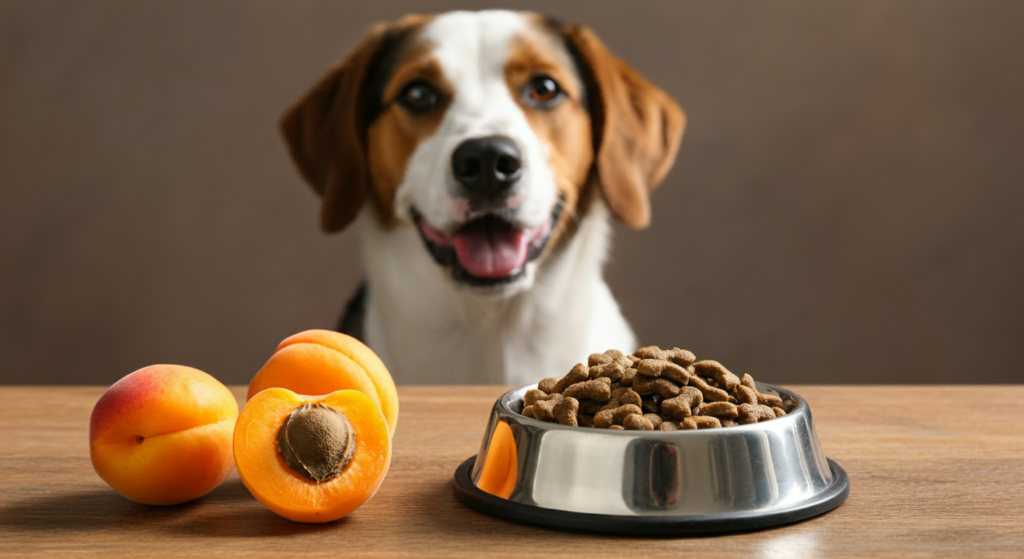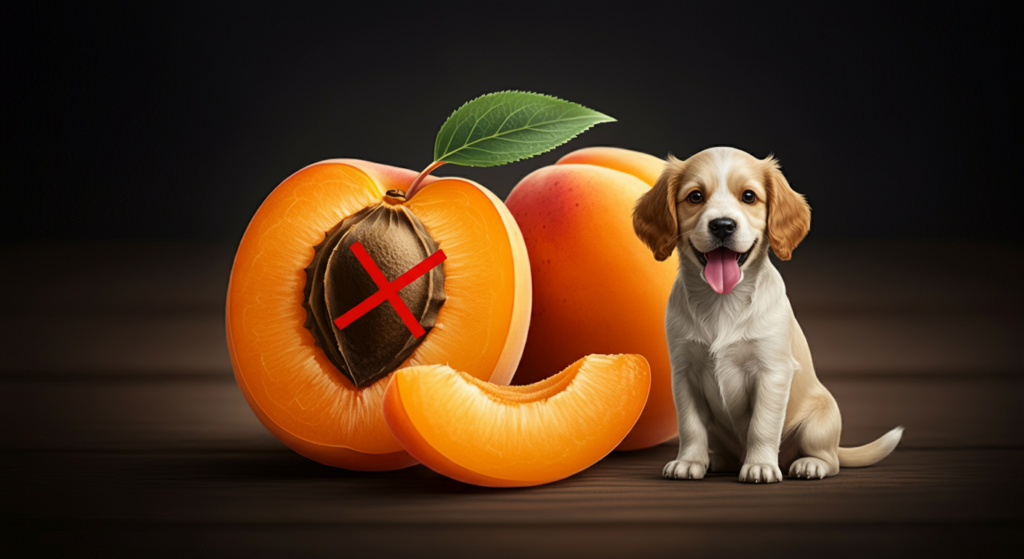Can Dogs Eat Apricots? 5 Great benefits for dogs!
Apricots and Dogs: A Sweet Treat or a Risky Bite?
Apricots are a delicious and nutritious treat for humans, often celebrated for their sweet flavour and health benefits. However, as a responsible dog owner, you might find yourself asking an important question: “Can dogs eat apricots?” Ensuring the safety of the foods you share with your furry friend is critical to their health and happiness.
Can Dogs Eat Apricots?
Yes, dogs can eat apricots in moderation, but there are important safety considerations to keep in mind. While the flesh of the apricot is safe and can even offer some nutritional benefits, the seeds, pits, and stems contain cyanogenic compounds that can be toxic to dogs. It’s crucial to remove these parts before offering apricots to your pet and to monitor the quantity to avoid digestive upset.
What Are Apricots?
Apricots are small, golden-orange fruits known for their sweet taste and health benefits. They are rich in vitamins A and C, fibre, and antioxidants. While fresh apricots are common, dried apricots are a convenient alternative, often found in snacks and desserts.
Here’s a nutritional table highlighting the key nutrients found in apricots, along with their Recommended Dietary Allowance (RDA) or Adequate Intake (AI) values for dogs where available:
| Nutrient | Amount in 1 Apricot (35g) | RDA/AI for Dogs | Benefits for Dogs |
|---|---|---|---|
| Calories | 17 kcal | Depends on dog’s size (approx. 25–30 kcal per pound of body weight daily) | Provides energy. |
| Carbohydrates | 3.9 g | No specific RDA | Source of natural sugars for quick energy. |
| Protein | 0.5 g | Approx. 1 g per pound of body weight daily | Supports muscle maintenance. |
| Fibre | 0.7 g | 2–4% of daily intake calories | Aids digestion and promotes gut health. |
| Vitamin A | 674 IU | 100–200 IU/kg body weight | Supports vision, immune system, and skin health. |
| Vitamin C | 3.5 mg | No specific RDA | Boosts immune function and acts as an antioxidant. |
| Potassium | 90 mg | 20 mg per pound of body weight daily | Helps maintain proper muscle and nerve function. |
| Beta-Carotene | 383 mcg | No specific RDA | Precursor to Vitamin A, supports healthy skin and coat. |
| Calcium | 3.5 mg | 50–60 mg per kg of food consumed | Supports bone health. |
| Iron | 0.14 mg | 1–3 mg/kg of food consumed | Aids in oxygen transport in the blood. |
Notes:
- Moderation is key: While apricots provide beneficial nutrients, they should only be an occasional treat, making up no more than 10% of a dog’s daily calorie intake.
- Precautions: Always remove the pit, stem, and leaves, as they contain cyanogenic compounds that are toxic to dogs.
- The RDA values for dogs vary by size, age, and activity level. Consult your vet for specific recommendations tailored to your pet.
But are dogs allowed apricots? Let’s find out.
Are Dogs Allowed Apricots?
Yes, dogs can have apricots, but not all parts of the fruit are safe. The flesh of the apricot is non-toxic and can be a healthy treat in small amounts. However, the pits, stems, and leaves contain cyanide compounds that are harmful to dogs. Always remove these parts before offering apricots to your dog.

Benefits of Apricots for Dogs
When prepared safely, apricots can offer several nutritional benefits for your canine companion. Here’s a detailed breakdown:
- Supports Digestive Health:
The natural fibre content in apricots promotes healthy digestion and can aid in preventing constipation. Fibre also helps maintain gut health by supporting the growth of beneficial bacteria. - Boosts Immune System:
Apricots are rich in antioxidants, including beta-carotene and Vitamin C, which help combat free radicals in your dog’s body. This strengthens the immune system and may reduce the risk of chronic illnesses. - Promotes Healthy Skin and Coat:
The beta-carotene in apricots is a precursor to Vitamin A, which is essential for maintaining healthy skin and a shiny coat. It also supports vision and eye health, especially in aging dogs. - Potassium for Muscle and Heart Health:
Apricots provide potassium, an essential mineral that supports proper muscle function and maintains a healthy heart. This is particularly important for active and senior dogs. - Low-Calorie Treat:
With a low calorie count, apricots make a healthy, guilt-free snack when given in moderation. They can be a great alternative to processed dog treats, especially for dogs on a controlled diet.
Risks of Feeding Apricots to Dogs
While apricots have nutritional benefits, there are significant risks involved if they’re not prepared or served correctly:
- Toxic Pits:
The most critical risk lies in the apricot pit (or stone). It contains cyanogenic compounds that release cyanide, a potentially deadly toxin. Even small amounts can lead to poisoning, so it’s crucial to remove the pits entirely before offering apricots to your dog. - Choking Hazard:
The hard, slippery pits can easily become lodged in a dog’s throat, particularly in smaller breeds, causing choking or intestinal blockages. - Digestive Upset:
Overfeeding apricots, or giving them to dogs with sensitive stomachs, can result in diarrhoea, vomiting, or general gastrointestinal discomfort. Always introduce new foods gradually to avoid these issues. - Apricot Poisoning Symptoms:
If your dog consumes an apricot pit or ingests excessive amounts of apricot flesh, they may display symptoms of toxicity, such as:- Excessive drooling
- Lethargy or weakness
- Difficulty breathing
- Dilated pupils
- Collapse in severe cases
Seek immediate veterinary attention if you notice any of these symptoms.
- Sugar Content:
Though apricots are low in calories, their natural sugar content can be problematic for diabetic dogs or those prone to obesity. Always consider your dog’s specific health conditions before offering any fruit.

Can Dogs Eat Dried Apricots?
Dried apricots are another option, but pet owners should exercise caution. Can dogs have dried apricots safely? While they lack pits, dried apricots are higher in sugar, which can lead to weight gain or dental problems in dogs. Always check for added preservatives or sulphites before sharing dried apricots with your pet.
How to Safely Serve Apricots to Dogs
To safely serve apricots to your dog:
- Wash the apricot thoroughly.
- Remove the pit, stem, and leaves.
- Cut the fruit into small, bite-sized pieces.
- Offer in moderation—one or two small slices are sufficient for most dogs.
- Monitor your dog for any adverse reactions.
If you’re unsure, consult your vet before introducing apricots to your dog’s diet.
Can Dogs Eat Apricot Jam?
While apricot jam might seem like a tempting treat to share with your dog, it’s generally not recommended. Here’s why:
High Sugar Content
Apricot jam is typically loaded with added sugars, which can be harmful to dogs. Excessive sugar intake can lead to weight gain, dental issues, and long-term problems such as diabetes. Dogs have no dietary requirement for sugar, and their systems are not designed to process it in large amounts.
Artificial Sweeteners
Some apricot jams may contain artificial sweeteners like xylitol, which is highly toxic to dogs. Even a small amount of xylitol can cause a dangerous drop in blood sugar levels, leading to symptoms like vomiting, weakness, tremors, and seizures. Always check ingredient labels carefully if you suspect your dog has consumed jam.
Preservatives and Additives
Commercial jams often contain preservatives, colourings, and other additives that are not suitable for dogs. These ingredients can upset your dog’s stomach and may even pose health risks over time.
Minimal Nutritional Benefit
Unlike fresh apricots, apricot jam has very little nutritional value for dogs. The processing involved in making jam often strips away the natural vitamins and minerals found in the fruit, leaving behind mostly sugar and calories.
Risk of Toxic Ingredients
If the jam contains apricot pits or traces of them (sometimes included in homemade jams for flavour), it could pose a risk of cyanide toxicity. Always ensure that any apricot-based product is free of pits and stems.
What If My Dog Eats Apricot Jam?
If your dog accidentally consumes a small amount of apricot jam, monitor them for signs of an upset stomach, such as vomiting or diarrhoea. However, if the jam contains xylitol or you notice unusual symptoms such as lethargy or tremors, contact your veterinarian immediately.

Healthy Alternatives
If you want to give your dog a sweet treat, consider offering small amounts of fresh apricot flesh instead. Alternatively, you can prepare a dog-friendly fruit purée without added sugars, artificial sweeteners, or preservatives.
While apricot jam may seem harmless in small amounts, its high sugar content, lack of nutritional value, and potential for toxic additives make it an unsuitable snack for dogs. Stick to fresh, unprocessed fruits to provide your furry friend with a healthier and safer treat.
Conclusion
Apricots can be a delightful and nutritious treat for dogs when prepared and served correctly. This sweet fruit offers several benefits, including aiding digestion, boosting the immune system, and supporting healthy skin and a shiny coat. However, the key to safely including apricots in your dog’s diet lies in proper preparation and moderation. Always ensure you remove the pits, stems, and leaves, as these parts contain toxic compounds that can pose serious health risks. Additionally, serve apricots in small, manageable portions to avoid any digestive upset.
As with any new food, it’s essential to monitor your dog’s reaction when introducing apricots for the first time. Some dogs may have more sensitive stomachs than others, and individual health conditions such as diabetes or obesity should also be considered before offering fruits like apricots. When in doubt, consulting your veterinarian is the best way to ensure your pet’s safety and well-being.
Remember, while apricots can provide a healthy occasional treat, they should never replace a balanced diet tailored to your dog’s specific nutritional needs. By making informed choices and prioritising your pet’s health, you can enhance their diet with safe and enjoyable additions like apricots.
Have you tried feeding apricots to your dog? Did they enjoy the fruity snack, or did you notice any reactions? Share your experiences, tips, and questions with us — we’d love to hear how you’re incorporating healthy treats into your dog’s routine! Your stories could inspire and help fellow pet owners make the best choices for their furry friends.

Fun Facts: Q & A
1 Are dried apricots ok for dogs to eat? Dried apricots are safe for dogs in small amounts, provided they are free from added sugar and preservatives. Always monitor your dog for any signs of discomfort.
2 What happens if my dog eats an apricot? If your dog eats a safely prepared apricot (without the pit), they may enjoy a tasty and nutritious treat. However, if they consume the pit or eat too many, watch for symptoms like vomiting, diarrhoea, or lethargy.
3 How much apricot can my dog have? Most dogs can safely enjoy one or two small slices of apricot as an occasional treat. Larger dogs may tolerate slightly more, but moderation is key.
4 Are dried apricots good for dogs? Dried apricots can be a good snack in small amounts, but they are high in sugar. Fresh apricots are a better choice for a healthier treat.
